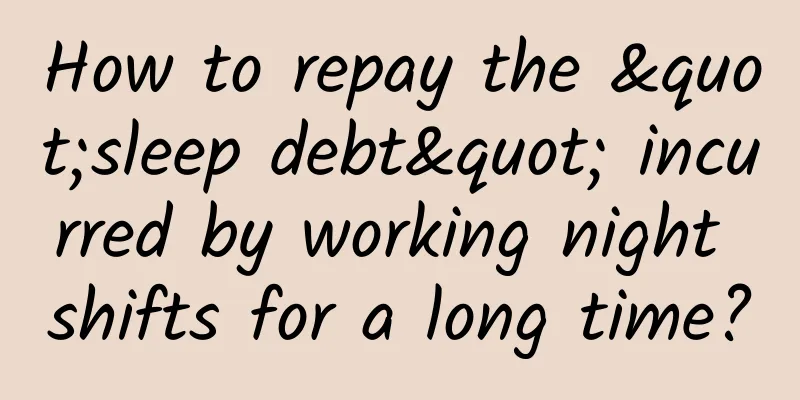How to repay the "sleep debt" incurred by working night shifts for a long time?

|
It is normal for medical staff to stay up late at night to work, but due to the small number of people on night shift and the high intensity of work, they sacrifice their own health while protecting the health of others. In the long run, it has a serious impact on the body and life, such as decreased immunity, hair loss, insomnia... Recently, an article published in BMJ pointed out that during the COVID-19 pandemic, insomnia and burnout caused by long-term high-pressure and high-risk working conditions will further increase the risk of infection for medical staff. 1. For every additional hour of sleep at night, the chance of contracting COVID-19 decreases by 12%. 2. Healthcare workers with insomnia, disrupted sleep, and daily burnout were 88% more likely to be infected with COVID-19 than those without sleep problems. 3. Compared with those who do not have any burnout, those who experience daily burnout are twice as likely to be infected with COVID-19, and those who are infected will have more severe symptoms and require a longer recovery period. Everyone knows that staying up late hurts your body and mind! But there are thousands of people working night shifts! How to pay back the "sleep debt" owed by working night shifts for a long time? 01 Why do people who often work night shifts have trouble sleeping? (Image source: Pexels) Before discussing improvement solutions, let’s first unlock a term - "shift worker syndrome", which means "your working hours coincide with your usual sleeping hours." Surveys show that about 20% of workers have worked night shifts. Why do people who often work night shifts have trouble sleeping? ① Frequent night shifts violate the rhythm of life The rotation of the earth forms day and night, forming the circadian rhythm, and evolving into the rule of "work during the day and rest at night". It will not change because of our short-term changes in work or living habits. ② The internal biological rhythm and the external physical environment do not match the rhythm of nature The mismatch of rhythm will cause night shift workers to have poor sleep during the day and insufficient alertness at night. Only by adapting to nature and the entire external environment can we get a good sleep. 02 How can people who work night shifts for a long time improve their sleep quality? (Image source: Pexels) We already know that the main reason for not sleeping well while working the night shift is that the internal circadian rhythm does not match the external environment. So how do we calibrate the "circadian rhythm"? First, let me introduce a concept to you - "minimum core body temperature". The lowest core body temperature often occurs two hours before we wake up. If you want to move to daytime sleep, for example, you go to bed at 7 am and wake up at 2 pm, then your lowest core body temperature should be adjusted to 11 pm or 12 pm. How can we push the "circadian core body temperature" back? ① After night shift, avoid exposure to light If you get some light, your circadian rhythm will move forward, so on your way home, you can put on some sunglasses to block out the light. ② Use melatonin in moderation Melatonin helps regulate our core body temperature and circadian rhythms, and can also have a calming effect. You can use 3 mg, 5 mg, or even 10 mg of melatonin after a night shift. ③ Create a comfortable, dark sleeping environment Using blackout curtains can block out shadows and light, helping us create a night-time environment during the day. 03 How can you sleep well during the day and work well at night? (Image source: Pexels) Want to sleep well during the day and be in good condition at night? Maybe you can try the following 4 methods: ① Before working the night shift, arrange 1-2 hours of regular sleep Sleeping for an hour or two before working the night shift can not only help us get more sleep, but also allow us to maintain a good state of alertness during the night shift. ② During the night shift, take a 30-60 minute nap If there are two or three people working the night shift, everyone can take turns taking a 30 to 60 minute nap, which can help us work more efficiently and alertly at night. ③ Maintain a certain amount of light at night The working environment at night should be kept relatively bright. If conditions permit, you can also place some light therapy panels to help us maintain better work efficiency at night. ④ Consumption of coffee, tea or wakefulness-promoting drugs At present, wakefulness-promoting drugs are relatively rare in China. We can maintain a good working state by drinking coffee or tea. If you are a "night shift worker" and have trouble sleeping, you can refer to the "Guide to Good Sleep for Night Shift Workers" "specially provided" by the above experts to make self-adjustments. I hope this scientific guide can help you return to a good sleep! |
<<: A mysterious signal that has continued for 35 years. Who is sending the unknown pulses?
Recommend
Will QQ red envelopes be able to stop Alipay’s counterattack?
In just over 30 days, it will be the Chinese New ...
Goodbye! iPhone jailbreaking is dead
I believe many friends still remember "PP As...
If the corals are gone, where will the crabs attach themselves to?
At present, global climate change, especially glo...
What did a group of scientists obsessed with farts do?
Leviathan Press: After reading the article, I sti...
The "Morning C and Late A" that is being enthusiastically recommended by the entire Internet, can it really whiten and fight aging?
The "morning C and night A" skin care m...
A generation of legendary phones is finally abandoned? iOS 16 may remove support for iPhone 6S/SE
You should know that in addition to the two hardw...
NDRC: Support mixed ownership reform in the automobile industry and establish a world-class automobile enterprise group
On July 4, the National Development and Reform Co...
"Variants that need attention"! Here's what you need to know about the new coronavirus JN.1 variant
1. What is the JN.1 variant? JN.1 is the second-g...
The advertising volume is not ideal? Facebook advertising optimization in practice!
There are thousands of problems with advertising,...
Dual-core noise reduction, lightweight, Sony WH-1000XM5 sets a new benchmark for noise reduction
In an era when true wireless headphones have beco...
Can you get infected with influenza B after influenza A? Actually, there is no need for "after", and the person who infected you is still treating you...
Recently there is a topic called #Can influenza A...
Why do peaches have hair? What should I do if I am allergic to it?
I have three impressions of peaches. The first is...
7 Ways to A/B Test Your App Store Pages
If someone tells you that you can increase your a...
Google officially starts testing Fuchsia OS: first-generation Nest Hub users please pay attention
Google spent a lot of time developing the Fuchsia...


![Liang Jinghong's Color Design Principles [HD]](/upload/images/67cc24fe11d10.webp)






